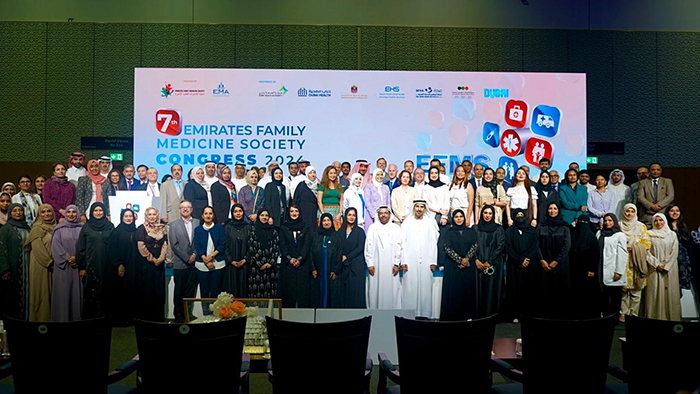The 7th Emirates Family Medicine Society Congress 2024, held at the Dubai World Trade Center under the patronage of His Excellency Sheikh Nahyan bin Mubarak Al Nahyan, the UAE Minister of Tolerance and Coexistence, which runs until April 24, witnessed extensive specialized participation and notable attendance by several leading figures in the health authorities of the UAE, GCC, broader Middle East region, alongside a wide range of experts, doctors, and stakeholders in the primary healthcare and family medicine sector.

Dr. Wadeia Sharief President of Emirates Family Medicine Society, opened the congress with an inspiring speech welcoming all participants, including governmental leaders, healthcare specialists, and thought leaders in the sector, emphasizing the event’s role in cementing commitment to advancing family medicine and primary healthcare in society. She highlighted the congress’s rich program, which aims to enrich the knowledge of healthcare professionals to provide the highest quality services to all members of society. She also praised the pioneering achievements of the UAE in the medical field, which have opened wide doors for establishing innovative medical practices in the country and positioned it as a leading center for cutting-edge technologies expected to drive a qualitative transformation in the healthcare landscape. Dr. Wadiah emphasized the role of artificial intelligence and meta-verse technologies and the opportunities they offer to enhance clinical decision-making efficiency, improve patient care, and streamline healthcare processes in line with the UAE’s 2071 Centennial Goals, which call for the integration of these revolutionary technologies into clinical practice to create a dynamic innovation system that places high-quality healthcare within reach of everyone in need.
Dr. Mohamed Farghali, Chairman of the Scientific Committee of the congress and Chairman of the Scientific Committee of the Emirates Branch of Family Medicine, presented the latest developments regarding the “Competence Program,” which is the most advanced health insurance system implemented in many countries, launched by the Dubai Health Authority. The program relies on artificial intelligence technology to identify cases most susceptible to chronic diseases such as diabetes, hypertension, among others. In the event that artificial intelligence detects any chronic diseases in a person or if the person is already sick, artificial intelligence identifies patients most vulnerable to complications of the disease, and early intervention is then carried out to prevent or mitigate complications.
Dr. Eddie Needham, Program Director and Academic Head of the Family Medicine Residency Program at AdventHealth Winter Park in the United States, delivered an important lecture outlining the top 10 evidence-based medical developments for 2024.
The congress also witnessed numerous inspiring discussions and dialogues on vital topics such as respiratory infections, osteoporosis, cardiovascular diseases, atherosclerosis, gout, gastrointestinal disorders, human papillomavirus, and other important topics in family medicine and healthcare sector in general.
Last year’s edition witnessed participation from doctors and specialists from 20 countries, spanning across GCC countries, Arab countries, Europe, and the United States, featuring over 80 scientific lectures delivered by more than 56 speakers on the latest global developments in family medicine, prevention, diagnosis, and treatment methods, highlighting significant advancements in the field over recent years.

COMMENTS